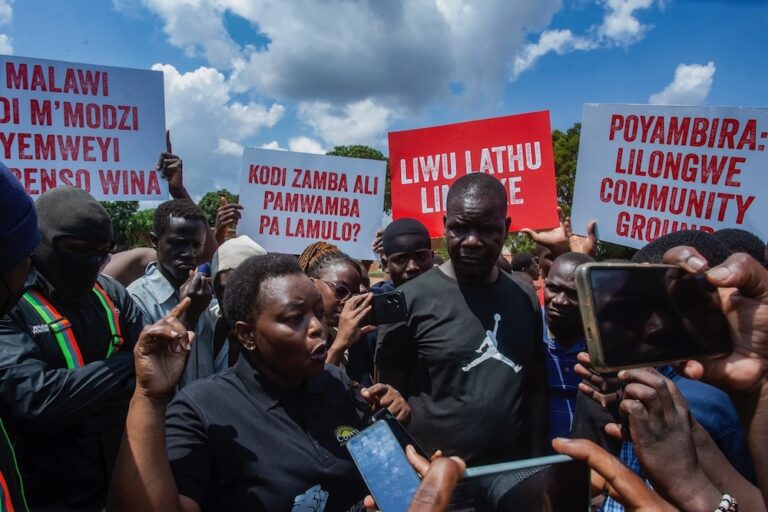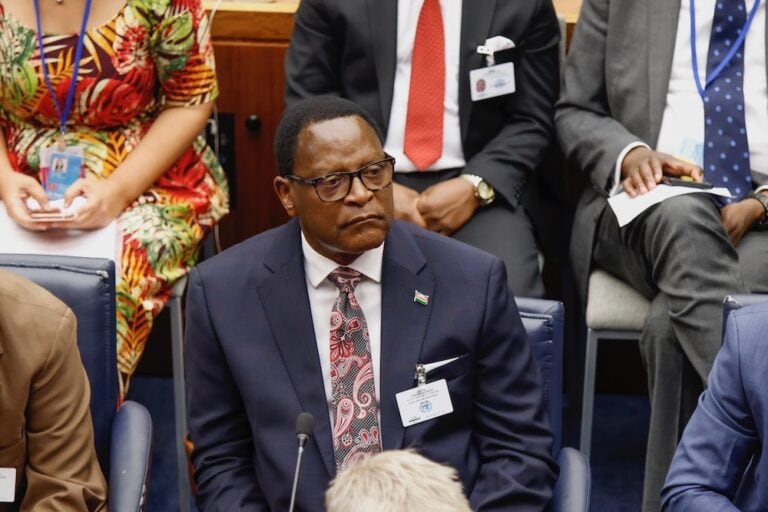MISA is concerned that threats to withdraw advertising will threaten the vibrancy of the country's private-sector media outlets and by extension, the country's nascent democracy.
(MISA/IFEX) – 12 March 2012 – The Malawi Chapter of the Media Institute of Southern Africa (MISA) is disturbed with repeated threats from the ruling Democratic Progressive Party (DPP) top brass on media outlets deemed to be critical of President Bingu wa Mutharika’s government policies.
Barely two days after State House issued a statement warning the media and civil society organizations against ‘insulting’ the country’s leadership, DPP Director of Youth, Frank Mwenefumbo, has called on all government departments and the civil service to stop buying, reading and advertising in newspapers critical of the DPP led government.
Mwenefumbo, who is also DPP Regional Governor for the north, made the call during a presidential launch of the construction of Zomba-Blantyre road in the old Capital Zomba, Southern Malawi, on Sunday, March 11.
Taking a direct swipe at one of the country’s main print media outlets, Nation Publications Limited (NPL), publishers of The Nation, Weekend Nation, Nation On Sunday and Fuko newspapers, Mwenifumbo said: “Newspapers have been writing bad things about the DPP and our President instead of reporting on good things. (So) if I see DPP loyalists, be it a (cabinet) minister or a Chief Executive, reading The Nation, we will suspect them; you should stop that forthwith. . .If I see the Nation newspaper in your offices (of government departments) we will suspect you. Stop buying it. Stop advertising in it! If you want adverts, you can do that on the internet.”
The government issued a similar ban on advertising in NPL newspapers in March 2010.
We find the recent order to stop advertising in NPL as well as threats on journalists in general very strange and retrogressive for Malawi’s nascent democracy. Attacks on the media, civil society and human rights defenders are attacks on democracy and should not be condoned.
Media outlets are part and parcel of any democratic state. They have a watchdog role in any such society. Malawians are also rational and capable of deciding what media outlet to read and listen to. It is sad and retrogressive that any individual should decide for Malawians which media products to consume.
We note that government has its preferences when it comes to choosing which media organizations to advertise with. It is a known fact, however, that advertising is the lifeblood of every vibrant private media institution and we fear that the DPP’s directive will cripple the operations of such media outlets and our nascent democracy in the process.
In this regard, we remind the DPP, Mr. Mwenefumbo especially, that government departments function on public funds. Consequently, such funds should be utilised to purchase media products, to provide all Malawians with the widest possible sources of information, including both private and state-owned media products.
Mr. Mwenefumbo is advocating for censorship of what Malawians should read and not read. This, if allowed to happen, will have repercussions beyond the misdirected intentions and desires of punishing critical media. For a country that is battling to improve its literacy levels to begin with, the expressed thoughts of the ruling party to take away Constitutionally-guaranteed freedoms and the use of young people to express such thoughts is not only puzzling but paints a very bleak picture of Malawi’s future if, indeed, it is true that young people are the future leaders.
MISA Malawi also maintains its position that through numerous broadcast programmes and published articles on health, agriculture, business, politics, culture, entertainment, economy, youth development, sports, good governance and rural development among others, the media in Malawi have immensely contributed to political stability, unity, development and economic growth and this validates the fact that the government and the media have worked as partners and should continue to do so.
We repeat our stand that democracy is about empowering citizens to take ownership of their own growth and development objectives, harmonizing them with national aspirations after interacting and engaging with differing views. This noble activity is guaranteed and protected by the Constitution of Malawi and is facilitated, on a daily basis, by the media.
His Excellency the State President openly swore to defend the Constitution and has in the past openly supported media development activities as part and parcel of his development agenda.
MISA Malawi therefore requests that President Mutharika personally distance himself from threats issued by DPP cadres to the media in the country and the Constitution he swore to defend.
MISA Malawi expects the State President to ensure that his administration remains the guarantor of media development and press freedom in Malawi as enshrined in the Malawi Constitution.
As we have indicated in the past, we would like to assure government that MISA Malawi does not condone biased reporting and neither does it encourage irresponsible journalism.
We are optimistic that His Excellency the State President and other top government officials, will take note of our appeal and if there are some concerns, they can be channeled through relevant media bodies for mediation. We believe this will help to clear the impression that Malawi government is taking systematic steps aimed at suffocating the media, thereby strangling our young democracy in the process.


